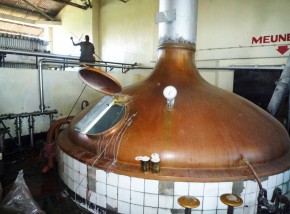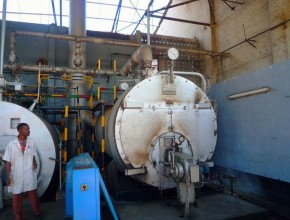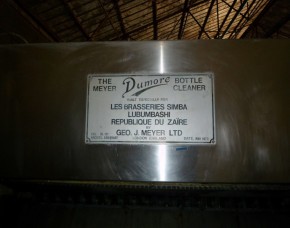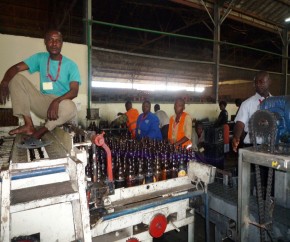A few weeks ago I saw an article in Foreign Policy about Primus, the ubiquitous beer of the Democratic Republic of the Congo. The authors, Jason Miklian and Peer Shouten, explore some of the social, cultural, and conflict dynamics of the Congo through the bottom of a dark brown Primus bottle. Primus is quintessentially Congo – available in the remotest corners of this vast country; a currency of exchange; a symbol of national unity more potent than the flag (whose colours and golden star are incorporated into the Primus label); and a Congolese institution that has survived longer than any of Congo’s forms of post-independence government, health system, or road infrastructure. I recently visited the Primus brewery in Kinshasa. It is one of the largest factories in the city, covering a huge area of industrial land close to the port of Kinshasa. Modern and clean, a hive of activity – health and safety yellow and black chevrons guiding pedestrians safely through the plant. Everyone in overalls, orange safety waistcoats, hard hats and protective glasses. Brand new, fully automated production lines pump out thousands of bottles of Primus each day to fuel Kinshasa, and the rest of the country’s, seemingly insatiable thirst.

But Primus is not the only beer in the Congo. And other, less celebrated beers fight against the odds to quench Congo’s thirst. Kananga, the capital city of Kasaï Occidental, is home to the Bracongo Brewery. Established in the 1940s, this brewery has been in production, largely unchanged, since then. Its main product is Skol laager, produced under licence from the European mark of the same name, strength and taste. On its busiest day, when the bottling plant is fully operational and the months’ production is being decanted and pasteurised ready for distribution, the plant employs 30 people. All but a handful are casual labourers. It is (reportedly) the largest single formal sector employer in Kasaï Occidental, a province with a population of 5 million.

The beer is brewed using the same techniques, and most of the same machines that were installed back in the 1950s and 1960s. Each piece of plant – from the brewing kilns; refrigeration units; fermentation vats; bottling and pasteurization machines – has an attendant engineer.
These engineers know the idiosyncrasies and peculiarities of their machine, and through endless adjustments and careful coaxing are able to keep the plant running – even though the equipment is well-past retirement age. The most recently installed machine is the Meyer Dumore bottle cleaner, produced in the UK, and installed in May 1972.
The bottles emerge from the cleaning process to be filled, under pressure, in the bottling plant. Any slight defects in the recycled bottles – some must have been through this process a hundred times – results in the bottle exploding, showering beer and glass onto the factory floor.

After pasteurisation and packing into crates, the beer is ready for distribution. Each morning, distributors arrive at the loading bays to take their crates. These range from articulated lorries that will leave fully ladened to inch along Congo’s dilapidated and eroded roads into the interior; to local traders who will pile their make-shift barrows with crates and push them into town to replenish the local hotels, restaurants, and road side bars. Beer is an important commodity in the Congo. It is one of the few things that works with any reliability – and one of the few items you can guarantee will be available. Even in Kananga, where transport infrastructure has eroded to the point where the city is virtually marooned, the brewery uses every ounce of guile and skill to keep the beer flowing. It demonstrates both the difficulty of operating a business in the Congo – but also the ingenuity of the Congolese to fettle a solution in this most complex of environments.

The Department is increasingly focused on how we work with businesses to make sure their plans help local communities. Our Secretary of State Justine Greening has just returned from a trip to Tanzania where she headed DFID’s first ever business delegation to Africa. She set out how DFID will trial four new partnerships with businesses in Tanzania. You can read her speech here.

Recent Comments